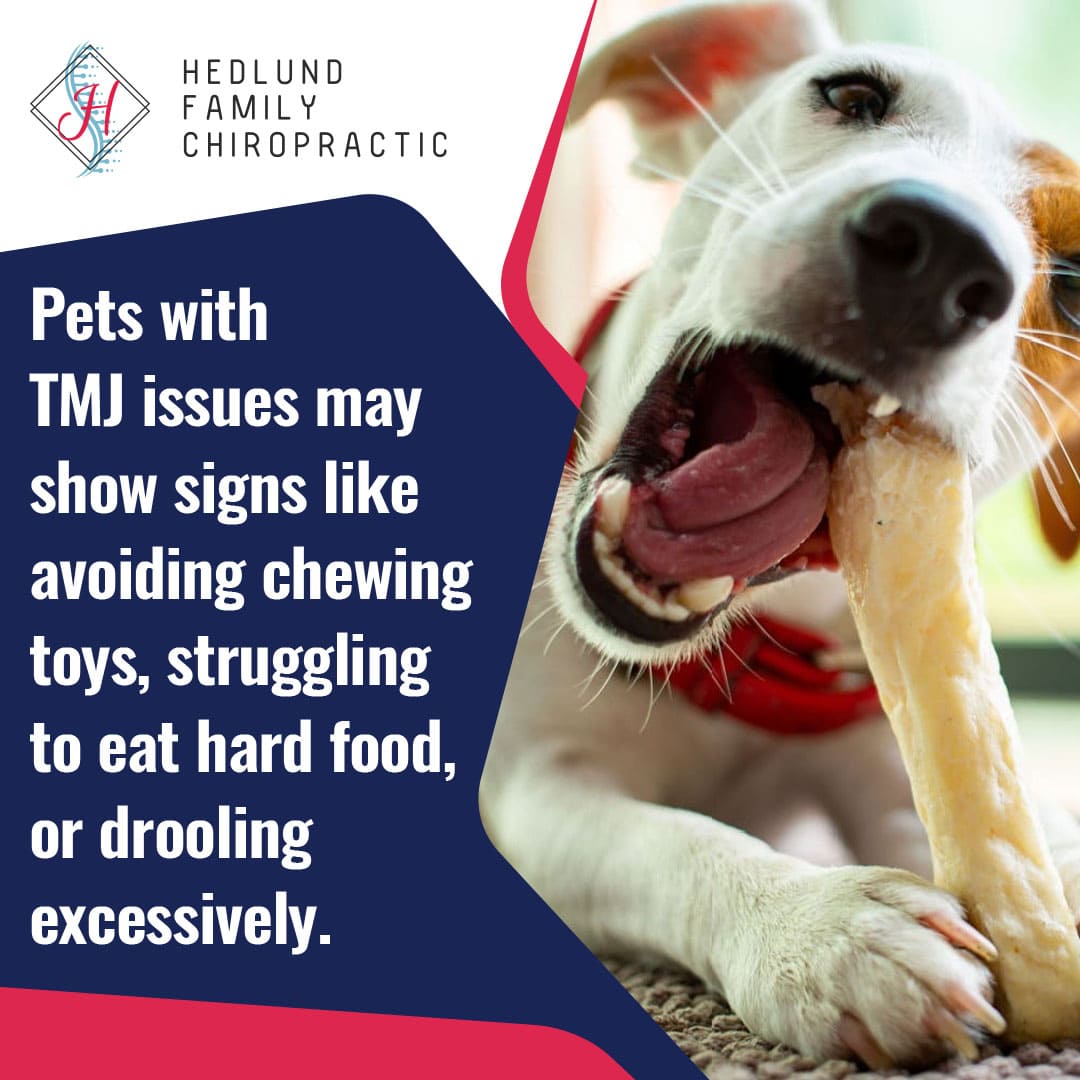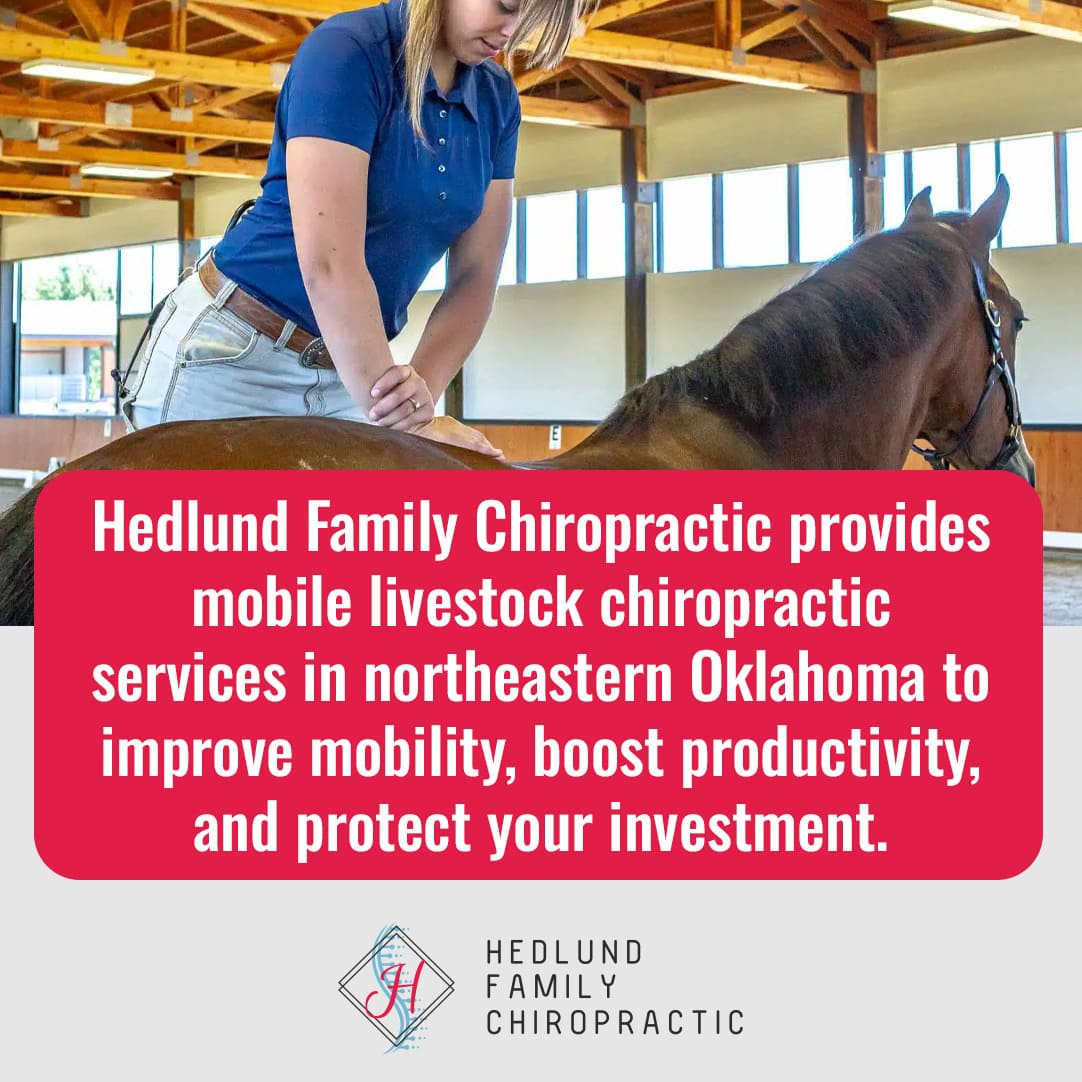Pet owners often overlook jaw problems in their beloved companions, attributing eating difficulties or behavioral changes to other causes. Yes, animals can develop TMJ (temporomandibular joint) disorders, and a chiropractor for animals can provide effective, non-invasive treatment. At Hedlund Family Chiropractic in Collinsville, OK, Dr. Justin Hedlund helps pets suffering from jaw pain and TMJ-related issues through gentle, specialized chiropractic care.
TMJ disorders in animals can severely impact their quality of life, affecting their ability to eat, play, and interact normally. Knowing these conditions and available treatment options can help pet owners make ideal decisions about their animal’s health and comfort.
Recognizing TMJ Disorders in Animals
What is TMJ in Dogs and Cats?
The temporomandibular joint, which joins the jaw to the skull, enables the mouth to open, close, and move side to side. When this joint becomes inflamed, misaligned, or injured, it can lead to TMJ disorders, which can cause pain and dysfunction. Although TMJ issues are more frequently identified in humans, many domestic animals, especially dogs and cats, are also affected.
Human and animal TMJ joints are prone to identical issues because of their very similar architecture. Unfortunately, animals are unable to express their displeasure verbally, which makes it more difficult for veterinarians and pet owners to identify problems early.
Common Causes of Jaw Problems in Pets
Animal TMJ issues can be caused by a number of circumstances. The most common cause of jaw issues in pets is trauma from falls, fights, or accidents. Additional frequent causes include congenital anomalies, oral disorders, arthritis, and excessive gnawing on hard things.
Many of the animals that Hedlund Family Chiropractic treats have TMJ issues as a result of compensatory movement patterns that were formed following injuries to other body parts. Over time, the jaw joint may become stressed when animals favor one side or change their typical movement patterns.

Signs Your Pet May Have TMJ Issues
Pets with TMJ issues must have their behavior and physical health closely observed in order to be diagnosed.
Signs of Behavior:
- Having trouble biting or eating
- Frequently dropping food while eating
- Pawing at the area of the face or jaw
- Unwillingness to chew toys or hard treats
- An increase in hostility or irritation
- Absence of participation in regular activities
Physical Indications:
- Enlargement of the face around the jaw
- Unbalanced jaw motion
- Popping or clicking noises during meals
- Too much drooling
- Restricted range of mouth opening
- Noticeable tenseness in the jaw muscles
Teaching pet owners how to spot these subtle indicators early on, when treatment is most successful, is part of our animal chiropractor strategy.
How Animal Chiropractic Care Addresses TMJ Problems
The Connection Between Spine and Jaw Function
The jaw joint is intimately connected to the spine through muscles, nerves, and fascial connections. Spinal misalignments can affect jaw function, and jaw problems can create compensatory issues throughout the spine. This interconnected relationship means that treating the whole animal, not just the jaw, often produces the best results.
Our animal chiropractors at Hedlund Family Chiropractic use their training in animal anatomy to identify and address complex relationships between jaw function and posture. By treating both the primary TMJ dysfunction and related compensatory patterns, we help animals experience more complete and lasting relief.
Gentle Treatment Techniques for Pet TMJ
Animal chiropractic treatment for TMJ involves extremely gentle techniques adapted for each species and individual animal. The pressure used is often no more than what you would use to check the ripeness of a tomato. These gentle adjustments help restore proper joint alignment and reduce inflammation.
Our affordable chiropractor approach makes TMJ treatment accessible to pet owners throughout Collinsville and surrounding areas. Treatment techniques may include gentle joint mobilization, soft tissue work, and craniosacral therapy, all adapted for the specific needs of each animal.
Benefits of Non-Invasive TMJ Treatment
Chiropractic care offers a drug-free alternative to managing TMJ disorders in animals. Many pets show improvement after just one or two treatments, with continued progress over several sessions. This non-invasive approach avoids the risks and side effects associated with long-term medication use.
The benefits often extend beyond just jaw function improvement. Many animals experience better overall comfort, improved appetite, and enhanced quality of life after receiving chiropractic care for TMJ issues.
Recognizing TMJ Symptoms in Your Pet
Eating and Chewing Difficulties
One of the most obvious signs of TMJ problems in pets is difficulty eating or chewing. Animals with TMJ disorders may eat more slowly, drop food frequently, or show a preference for soft foods over hard kibble. Some may tilt their head to one side while eating or use only one side of their mouth.
Owners might notice their pet avoiding previously enjoyed chew toys or treats. This behavior change often indicates discomfort or pain associated with jaw movement and should prompt evaluation by a professional.
Behavioral Changes and Pain Signals
Animals in pain often exhibit behavioral changes that can indicate TMJ problems. Increased irritability, reluctance to have their head touched, or withdrawal from normal activities can all signal jaw discomfort. Some animals may become more aggressive when approached near their head or mouth.
Other behavioral signs include excessive pawing at the face, rubbing the jaw area against furniture, or showing reluctance to play with toys that require mouth use. These subtle changes are often the first indicators of developing TMJ problems.
Physical Signs of Jaw Dysfunction
Physical examination may reveal several signs of TMJ dysfunction. Facial asymmetry, muscle tension around the jaw area, and limited range of motion when opening the mouth are common physical findings. Some animals may have visible swelling or heat around the jaw joint.
Clicking, popping, or grinding sounds when the animal opens or closes their mouth can indicate joint dysfunction. These sounds, combined with other symptoms, often confirm the presence of TMJ problems requiring professional attention.
Affordable Chiropractor Solutions for Pet TMJ Care
Cost-Effective Treatment Options
Hedlund Family Chiropractic offers reasonable pricing for animal TMJ treatment, with sessions typically ranging from $40-$85, depending on the size and needs of the animal. This cost-effective approach makes professional TMJ care accessible to pet owners who want to help their animals without breaking the budget. Early intervention often requires fewer total treatments than waiting until problems become severe.
The investment in chiropractic care for TMJ often pays for itself by preventing more expensive treatments later. Animals that receive early treatment typically maintain better function and require less intensive intervention over time.
Long-Term Benefits of Early Intervention
Early treatment of TMJ problems can prevent the development of chronic pain conditions and secondary complications. Animals that receive prompt treatment often recover more completely and maintain better jaw function throughout their lives. This early intervention can prevent the need for more invasive treatments or long-term medication management.
The long-term benefits include better nutrition from improved eating ability, reduced pain and discomfort, and maintenance of normal behavioral patterns. These improvements contribute substantially to the animal’s overall quality of life and well-being.
Comparing Traditional vs. Chiropractic Approaches
Traditional veterinary treatment for TMJ often involves medication and surgery. Chiropractic care offers gentler alternatives. Many animals respond well to chiropractic treatment, reducing or eliminating the need for long-term medication.
Traditional Veterinary Approaches:
- Pain medication for symptom management
- Anti-inflammatory drugs to reduce swelling
- Surgical intervention in severe cases
- Long-term medication dependency
- Focus on symptom control rather than root causes
Chiropractic Care Benefits:
- Drug-free, non-invasive treatment approach
- Addresses underlying joint dysfunction
- Reduces the need for long-term medications
- Gentle techniques suitable for all animals
- All-around approach to overall health
The chiropractic approach can be used alone or in combination with traditional treatments, depending on the severity of the condition and the individual animal’s needs. This flexibility allows for personalized treatment plans that maximize benefits while minimizing risks.
The Role of a Chiropractor for Animals in TMJ Treatment
Specialized Training in Animal Anatomy
Dr. Justin Hedlund is an American Veterinary Chiropractic Association (AVCA) certified, highly experienced chiropractor in Northeast Oklahoma. His certification reflects advanced training and expertise in animal chiropractic care, allowing him to safely and effectively treat TMJ disorders across different animal species.
Recognizing the unique anatomical differences between species is important for effective treatment. Dogs, cats, horses, and cattle all have different jaw structures and movement patterns that require specialized approaches for optimum results.
Well-Rounded Approach to Pet Health
Animal chiropractic care takes an all-encompassing approach to pet health, considering the whole animal rather than just the specific problem area. This approach recognizes that TMJ problems can affect and be affected by other body systems. By addressing the animal’s overall health and movement patterns, we can often achieve better and more lasting results.
Our approach at Hedlund Family Chiropractic also includes consideration of the animal’s lifestyle, activity level, and environmental factors that may contribute to TMJ problems. This comprehensive view helps prevent recurrence and supports long-term health.
Working with Your Veterinarian
Chiropractors for animals work best when coordinated with your regular veterinarian. We maintain good relationships with local veterinarians and encourage communication between all members of your pet’s healthcare team. This collaborative approach often leads to better outcomes for animals with complex health issues.
Hedlund Family Chiropractic can work alongside your veterinarian to provide integrated care that addresses all aspects of your pet’s TMJ condition. This team approach allows for the best possible treatment plan tailored to your animal’s specific needs.

TMJ Treatment for Different Types of Animals
Dogs with Jaw Problems
Dogs are commonly affected by TMJ disorders, particularly larger breeds and those with active lifestyles. Trauma from playing, fighting, or accidents can damage the TMJ joint, leading to pain and dysfunction. Working dogs and sporting breeds may be at higher risk due to their active nature and potential for injury.
Treatment for dogs often focuses on gentle joint mobilization and soft tissue work around the jaw and neck area. Many dogs respond quickly to treatment, showing improved eating habits and reduced pain within a few sessions.
Large Animals and TMJ Issues
Horses and cattle can also develop TMJ problems, though they may be more challenging to diagnose due to their size and behavior patterns. Large animals with TMJ issues may show difficulty with bit acceptance, head shaking, or changes in eating patterns. These signs are often subtle and may be attributed to other causes.
Treatment of large animals requires specialized techniques and safety considerations. Hedlund’s experience with various animal species allows him to safely and effectively treat TMJ problems in horses, cattle, and other large animals.
Age-Related TMJ Concerns
Older animals may develop TMJ problems as part of the normal aging process or as a result of long-term wear and tear. Arthritis can affect the TMJ joint just as it affects other joints in the body. Senior animals may benefit from regular chiropractic care to maintain jaw function and comfort.
Age-related TMJ problems often develop gradually and may be overlooked as normal aging. However, treatment can greatly improve the quality of life for senior animals, allowing them to eat more comfortably and maintain better nutrition.
Preventing TMJ Problems in Pets
Proper Nutrition and Jaw Health
Providing appropriate nutrition and feeding practices can help prevent TMJ problems in pets. Feeding diets that require appropriate chewing without being excessively hard can help maintain jaw health. Avoiding extremely hard treats or bones that could damage the TMJ joint is important for prevention.
Regular dental care also plays a role in TMJ health. Animals with dental disease may develop altered chewing patterns that can stress the TMJ joint over time. Maintaining good dental health supports overall jaw function.
Safe Chewing Toys and Activities
Choosing appropriate chew toys and activities can help prevent TMJ injuries. Toys should be firm enough to provide dental benefits, but not so hard that they could damage the jaw joint. Avoid toys or bones that are harder than the animal’s teeth, as these can cause trauma to the TMJ.
Supervising play activities and preventing fights or rough play that could result in jaw trauma is also important. Teaching animals appropriate play behavior can help prevent injuries that lead to TMJ problems.
Regular Health Monitoring
Regular health monitoring can help identify TMJ problems early when they’re most treatable. Pet owners should observe their animals’ eating habits, behavior, and physical condition for signs of jaw discomfort. Early detection allows for prompt treatment that can prevent more serious problems.
Annual wellness examinations should include evaluation of jaw function and TMJ health. This preventive approach can identify developing problems before they become painful or debilitating.
Research Supporting Animal Chiropractic Care for TMJ
Clinical Evidence for Animal Chiropractic Treatment
Research supports chiropractic care as a safe, non-invasive option for addressing musculoskeletal conditions in animals, including TMJ-related problems. According to veterinary studies, many animals treated with chiropractic adjustments experience improved jaw mobility and reduced pain. While this approach can benefit a range of species, unfortunately, at Hedlund Family Chiropractic, we currently do not treat cats (felines).
Getting Started with Animal TMJ Treatment
Initial Assessment Process
The initial assessment for animal TMJ problems includes a thorough health history and physical examination. At Hedlund Family Chiropractic, we evaluate the animal’s jaw function, range of motion, and overall posture to identify areas of dysfunction. This thorough assessment helps develop an appropriate treatment plan.
The examination also includes observation of the animal’s behavior and interaction with their owner. This information helps identify subtle signs of discomfort that might not be apparent during the physical examination alone.
Treatment Plans and Expectations
Treatment plans for animal TMJ are individualized based on the specific needs and condition of each animal. Most animals require 2-4 treatment sessions to see significant improvement, with some needing ongoing maintenance care. The treatment plan is adjusted based on the animal’s response and progress.
Realistic expectations are important for successful treatment outcomes. While many animals show rapid improvement, others may require more time and treatments to achieve desired results. Patient owners who follow through with recommended treatment plans typically see the best outcomes.
Ongoing Care and Maintenance
Some animals may benefit from ongoing maintenance care to prevent the recurrence of TMJ problems. Regular check-ups and treatments can help maintain jaw function and prevent the development of chronic issues. This preventive approach is particularly beneficial for animals with active lifestyles or those predisposed to TMJ problems.
The frequency of maintenance care depends on the individual animal’s needs and response to treatment. Some animals may need monthly treatments, while others may only require occasional check-ups to maintain their health.
Break the Cycle of Pet TMJ Pain with Professional Care
TMJ disorders in animals can considerably impact their quality of life, but effective treatment is available through specialized animal chiropractic care. At Hedlund Family Chiropractic in Collinsville, OK, we understand the unique needs of animals with jaw problems and provide gentle, effective treatment that addresses both symptoms and underlying causes.
Don’t let your pet suffer in silence with jaw pain and eating difficulties. Our affordable chiropractor services make professional TMJ care accessible to pet owners throughout Collinsville and surrounding areas. With Dr. Hedlund’s certifications and specialized training in animal chiropractic, your pet will receive the highest quality care available.
Get in Touch With US Today!
Contact us today to schedule a consultation for your pet and discover how our animal chiropractors can help restore comfortable jaw function and improve your companion’s quality of life. Your pet deserves to eat, play, and live without pain, and we’re here to help make that possible.


